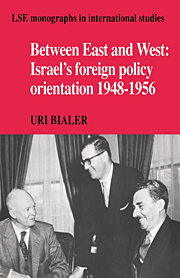Book contents
- Frontmatter
- Contents
- Acknowledgments
- INTRODUCTION
- Part I THE INTERNAL DIMENSION
- 1 THE AFFILIATION DILEMMA
- 2 PUBLICISM, INTER-PARTY POLITICS AND NON-ALIGNMENT
- Part II RED STAR OVER ZION
- Part III THE WESTERN CONNECTION
- EPILOGUE: “A people that dwells alone”?
- Appendix 1 U.N. voting record
- Appendix 2 Biographical notes
- Appendix 3 Israel's votes at the U.N.
- Index
- LSE MONOGRAPHS IN INTERNATIONAL STUDIES
2 - PUBLICISM, INTER-PARTY POLITICS AND NON-ALIGNMENT
Published online by Cambridge University Press: 24 November 2009
- Frontmatter
- Contents
- Acknowledgments
- INTRODUCTION
- Part I THE INTERNAL DIMENSION
- 1 THE AFFILIATION DILEMMA
- 2 PUBLICISM, INTER-PARTY POLITICS AND NON-ALIGNMENT
- Part II RED STAR OVER ZION
- Part III THE WESTERN CONNECTION
- EPILOGUE: “A people that dwells alone”?
- Appendix 1 U.N. voting record
- Appendix 2 Biographical notes
- Appendix 3 Israel's votes at the U.N.
- Index
- LSE MONOGRAPHS IN INTERNATIONAL STUDIES
Summary
Necessarily, Israel's official policy of maintaining friendly relations with the two superpowers required considerable caution in foreign policy activity; it also demanded equal care and consideration in internal public pronouncements. The difficult test for this policy was the treatment of Communism and the Soviet Union by party publicists. Mapai's party line had been strictly observed even prior to statehood. Criticism–some of it sharp–was occasionally voiced in internal debates on orientation issues with Hashomer Haza'ir, “Faction B” and later Mapam. But, in general, party members exercised restraint in oral and written pronouncements affecting the Soviet Union. The motive was essentially pragmatic–the desire to pierce the barrier between the Jewish community in Israel and Russian Jewry, and the fear that adverse comment might be detrimental. Herzl Berger, one of Mapai's ablest writers, aptly expressed this approach at a meeting of the Mapai Secretariat in March 1949: “We have been in an unpleasant situation for years; we have divided the work in the labor movement [referring to Mapai vs. Hashomer Haza'ir]–we know the truth and keep silent, while others know the truth and lie; we hear how they lie while they know the truth, and again we keep silent, because we still hope there is a faint hope to save Jews.” This line, prevalent in party publications prior to statehood, was reinforced during the early years of independence because of the official policy of non-alignment.
- Type
- Chapter
- Information
- Between East and WestIsrael's Foreign Policy Orientation 1948–1956, pp. 35 - 54Publisher: Cambridge University PressPrint publication year: 1990



